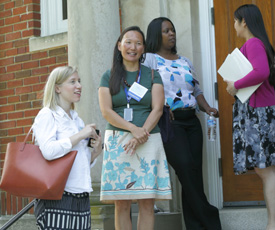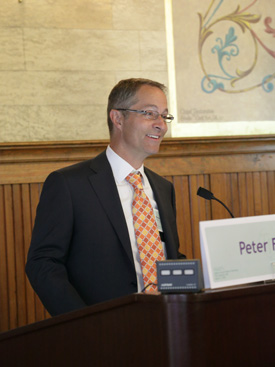The Training Page
SPECIAL FROM THE FELLOWS AT NIAID
Fellows Advised to Seize Unexpected Opportunities…and Even Fake It?
Learn what you love, get involved with interesting opportunities outside the lab, and integrate your life with your career goals. That was the message to postdoctoral fellows at the National Institute of Allergy and Infectious Diseases (NIAID) who attended an annual retreat recently.

BILL BRANSON
NIAID fellows attended a retreat recently that offered advice on being effective communicators, networking, and charting a unique career path. Here, several retreat participants are practicing their networking skills: (from left) Rebecca Baker, Jessica Chertow, Yolanda Williams-Bey, and Shu Hui Chen.
The retreat, held in the Cloisters (Building 60) on May 12, was led by NIAID Fellows Advisory Committee co-chairs Shu Hui Chen and Kristen Kindrachuk and the director of NIAID’s Office of Training and Diversity, Wendy J. Fibison. The retreat offered career development resources on such topics as communication, building a professional network, and charting a unique career path. Panel sessions focused on transferrable skills both on and away from the bench, and opportunities to build new areas of experience through short-term detail assignments.
Keynote speaker Peter Fiske, a nationally recognized author and lecturer on leadership and career development for young scientists and engineers, presented “Putting Your Science to Work: Career Strategies for Early-Career Scientists” and “The Neuroscience of Selling.” He addressed the antipathy scientists often feel about selling themselves and cited research from Nobel-prize winner Daniel Kahneman (he shared the 2002 Nobel Memorial Prize in Economic Sciences for his work on the psychology of judgment, decision-making, and behavioral economics), which shows that most decisions are based on rapid and intuitive thinking and not on the logical and deliberate thinking methods cultivated by scientists. Effective communication addresses both kinds of thinking: High-impact presentations, Fiske pointed out, tell a story that makes the scientist appear trustworthy, authoritative, interesting, sympathetic, safe, and funny and are targeted to the personality and needs of the audience.
But what about scientists who feel they can’t sell themselves? Fiske’s advice was to practice their presentations and, surprisingly, to “fake it.” According to social scientist Amy Cuddy at Harvard Business School, individuals can fool themselves as well as others into thinking they feel calm and powerful just by adopting certain physical postures.
In a pep talk about the desirability, versatility, and utility of Ph.D. scientists, Fiske offered fellows a rousing round-up of their skills: the capacity for deep thought; the ability to give and accept criticism; a knack for problem-solving; a talent for public speaking, communication, and persuasion; and the ability to work in situations where there is ambiguity.

BILL BRANSON
Keynote speaker Peter Fisk, a nationally recognized author and lecturer on leadership and career development for young scientists and engineers, presented “Putting Your Science to Work: Career Strategies for Early-Career Scientists” and “The Neuroscience of Selling.”
Fiske warned, however, that “the curse of being smart” can limit scientists who are too narrowly focused, who are averse to risk or failure, or who can’t understand the intelligence of other types. Because they are keenly aware of the difficulties of pursuing the academic career path, scientists often act out of anxiety rather than self-confidence when seeking careers outside the lab. Fiske encouraged fellows to find a job that’s the best fit for them by identifying not only their skills, but also their values and interests.
Echoing this advice, NIAID Scientific Director Kathryn Zoon—who has a Ph.D. in biochemistry, trained at NIH, and worked at FDA, NCI, and now NIAID—highlighted the unpredictable turns her own career has taken. Her work, she said, has been driven in unexpected ways by technological developments, new laws governing recombinant DNA technology, the serendipity of working in a lab that identified and characterized interferon, and the recognition that interferon could be valuable as a therapeutic. She attributes her success to her willingness to embrace unexpected opportunities.
Zoon reminded fellows that NIAID’s mission includes the training of biomedical scientists. She acknowledged the tough realities that trainees face: having to compete in a crowded field of Ph.D. scientists; enduring a long training time; expecting relatively low early-career salaries; and not being adequately prepared for careers outside of academia. But she went on to list the many career opportunities—both at and away from the bench—at NIH that are available to fellows: staff scientists, staff clinicians, statisticians, epidemiologists, scientific review officers, tenure-track and tenured scientist positions, and policy and administrative positions. She reminded fellows to seek the help of their mentors and emphasized that mentors’ jobs are not to build armies of “mini-me’s,” but rather to help trainees identify and make progress toward their individual career goals.
Workshop panelists offered more advice, including the suggestion that fellows find volunteer opportunities both in and outside of NIH in order to gain new experiences and document interests and skills. Trainees were also urged to “find your inner extrovert” and expand their professional networks by conducting informational interviews and finding many mentors in their current field as well as the field they wish to enter.
The workshop’s refrain: NIH is the best place to be a fellow, with opportunities everywhere just waiting to be seized.
Rebecca Baker was a postdoctoral fellow in NIAID (2010–2014) and is now a health-science policy analyst in the Office of Clinical Research and Bioethics Policy in NIH’s Office of the Director.
This page was last updated on Wednesday, April 27, 2022
